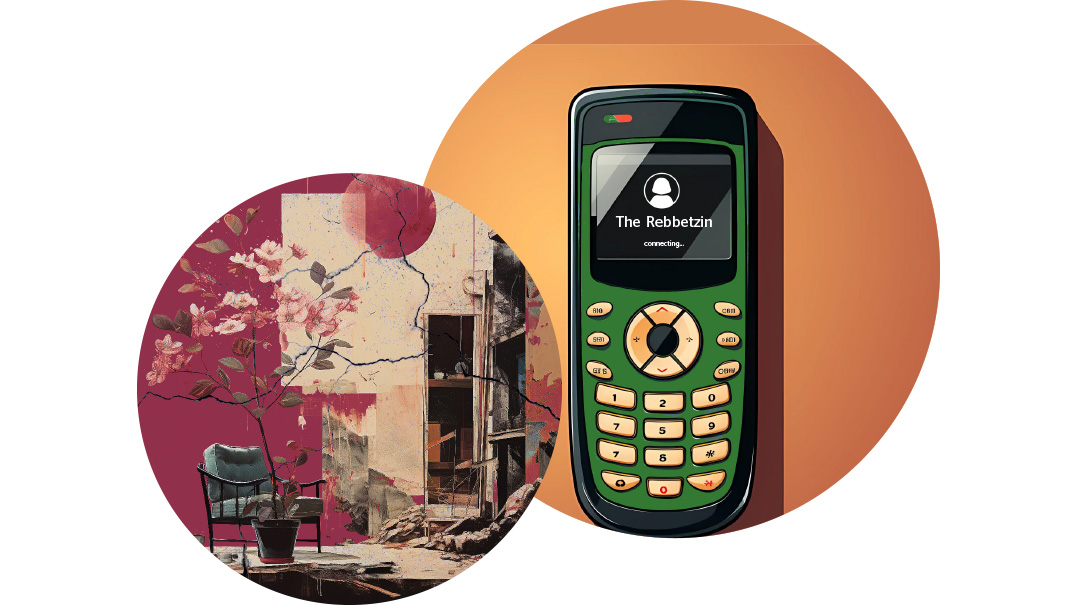Family First Inbox: Issue 890

“Let’s be realistic about the burden, and then we can say we are happy to take it”

Gebrochts Crimes [Quick Q / Issue 889]
I laughed when I saw the poll about whose minhagim you follow, your mother’s or your mother-in-law’s. I still remember what my kallah teacher told me before I got married: “Always remember, the most important minhag of all is shalom bayis.” I recite that to myself like a mantra each year, as I watch my husband obliviously eat his matzah, dropping crumbs freely all over my Pesach dishes. And I keep reciting it, through teeth that grow progressively more gritted, until at some point I snap and say, “No crumbs on the silverware! Gebrochts!” My kids think I’m nuts and I think they’re all committing terrible gebrochts crimes.
The good news is, over the years I’ve managed to work on my middos enough so that each year I snap later and later on Yom Tov. My hope is that for our 50th anniversary, I won’t even complain when my husband puts scrambled eggs on his matzah.
Name Withheld
Let’s Be Realistic [When There’s Room in the Heart / Issue 888]
This was a beautiful and heartwarming feature, and I really enjoyed the read. But it did feel like it was glossing over the fact that having grandparents living in the house almost always comes with challenges and sacrifice. All the families who were interviewed made it seem like the experience was always wonderful and positive. That’s not the case for anyone I know who lived with such an arrangement. Sure, most times the positive outweighs the negative, but let’s be realistic about the burden, and then we can say we are happy to take it.
Anonymous
You Touched Our Hearts [War Diaries / Issue 888]
Thank you, Emuna Stein, and your husband and children, for all your love, dedication, and sacrifice.
We have five children and grandchildren who have been serving in the army during this time. All have recently returned home with the exception of one. He’s responsible for 110 reserve soldiers on the Lebanese border. He won’t be with his wife and eight children for Pesach, like so many hundreds of thousands of others, because our country is at war.
You and your family have been providing badly needed protection to Am Yisrael. Your choice to make difficult sacrifices during this time touches our hearts and gives us strength.
Miriam Rebibo
Stay in Your Lane [To Be Honest / Issue 888]
Thank you, Sima Schon, for your piece about vulnerability in business. I’m a millennial consumer — which means I’m not ancient, but still professional — and I cannot tell you how annoying all this faux vulnerability is from the other side.
“It’s my wedding anniversary! And I’m running a sale so you can celebrate!” is a marketing scheme I’ve been seeing all over in the past few years, and it makes me want to run the other way. Why do I care that it’s your wedding anniversary? Why is everything about you — the seller? I think of my mother-in-law, who’s been running a steady, home-based business for 30 years, and the specials she runs. “It’s your birthday! Let me honor YOU with 20 percent off.”
We’re a self-centered society. I don’t know if this faux vulnerability is the cause or just a contributor, but I do know that it’s high time we went back to staying in the professional lane.
Chani Klein
I’m Old School [To Be Honest / Issue 888]
I love this column; it provides a really important soapbox for addressing societal issues in a nonthreatening manner.
I’d like to add to the point made so eloquently by Sima Schon, if I may.
I’m youngish millennial/Gen Z, but I’m old school in the way Sima describes it. I’m not on social media, I’m painfully formal in all official correspondence, and wouldn’t dream of sharing any aspect of my private life with people I’ve ever met. No parasocial relationships here, no sir.
And I think that in the corporate world, this “vulnerability” has taken the place of “respect.” I can’t speak authoritatively on the rules of social media, but I work for HR in a large company, and I want to share my observations from being on the receiving end of such emails.
When you send a formal email to a professional that you’ve never met but would like to start a relationship with — that’s not “unoriginal” or “boring”; it’s respecting professional standards and following the accepted rules for corporate interactions.
When I receive one of these “vulnerable” job applications, my gut instinct is to reject it straight away. There’s certainly room for personal expression, especially when the conversation has been started and initial interest established. But addressing someone as your friend when you’ve never met them, while potentially fine for Instagram, is not okay in the corporate world. It implies a lack of respect for the person on the other end. It means you haven’t taken the time to learn the rules of the game, or that you did but you’ve decided you’re above them. That’s not a good impression to make in workplaces that prioritize reliability and performance.
And besides, it’s uncomfortable receiving such over-familiar emails from somebody I’ve never met. I’d love to know about your likes and dislikes and personality quirks, but not until I’ve met you in person and established a rapport. Boundaries, people!
We’re always looking for new talent, and we prefer to hire vibrant people with creative personalities. It’s also important for us to have workers who follow social norms and respect the workplace atmosphere. Take the time to show that you can do both.
Thank you, Family First, for providing a platform for these important conversations.
Leah B.
NY
Justice for Freelancers [To Be Honest / Issue 888]
Dear Sima Schon,
I read your recent To Be Honest about vulnerability on LinkedIn and in emails and other similar platforms. First of all, I think this issue only affects a small segment of our population. I have hardly ever come across this issue before and I never experienced that kind of tone in emails. I agree about one thing, and strongly disagree about another. I’ll start with the agreement: If I hired someone professional to do a job for me, whether it's because I don't have time or the skill to do it myself, I don’t want to hear about her vulnerabilities. For example, I recently hired a party planner. I knew she was talented, and more or less organized, but I really didn't want to hear about any insecurities she has with being up-to-date with the trends, or how narrow her selection of table rentals is. So I agree with you on that.
I disagree with you that freelancers have to remain buttoned up at all times. They are independent contractors! That means they basically work by themselves for 75 percent of the day. Let them have a little fun! Let them write quirky personable emails, and take a selfie with you to proclaim your new bff status. Assume they are lonely and need some social stimulation or entertainment a few minutes a day! Why not give them that pleasure?
I fully understand and agree that there is a time and place to be vulnerable, and more importantly, there is a way to do it. Never ever say anything about yourself that is too personal or can be perceived as untzniyus in ANY way. It’s not cool and it's very unattractive. (Like no drool on pillows — disgusting.) But how about this — humor a work-from-home mom for a minute and assume she's just trying to have some fun, lighten up her day, and send her a comment back in a private message to continue the conversation.
C. Newmann
Anti-C and E Antibodies [Highly Sensitive / Issue 887]
I’ve read a lot of articles that have resonated with me over the years, but this week’s cover story was as if someone took the words out of my mouth. I was just nodding along. “Yes! Exactly!”
Alloimmunized, MCA dopplers, extra growth scans, hemolytic anemia, too low to titer, 1:4… I absolutely relate.
I also have antibodies, and I enjoyed reading an article about exactly the protocol of monitoring and testing that I go through every time I'm expecting. Usually, the reaction I get from people when I say I have antibodies is, “Isn’t there a shot for that?” I don’t have Rh factor; I have antibodies (anti-C, anti-c, and anti-E), so there is no shot to take. All there is to do is monitor, and intervene if necessary.
Baruch Hashem, my titers remained low, and the only interventions I needed were induction at term and UV lights for the baby’s elevated bilirubin.
I remember sitting with my husband at the big wooden desk across from the MFM doctor at our initial appointment. Being considered high risk is extra stressful (More what-ifs! More appointments! More schedule upheaval!) yet also more calm. MFM deals with this all the time; they are so much more familiar with this type of pregnancy, and took it much more in stride than my general OB-GYN.
As the narrator said, “It was clearer than ever to me that the ‘normal-feeling’ pregnancies I’d had were a thing of the past.” So true. I have trouble answering the most basic question, “When are you due?” and its corollary, “Are you usually on time/early/late?” because it doesn’t much matter. It always depends on the numbers. Waiting to go into labor naturally is a thing of the past. High risk is just a different reality.
And this one: “Friends and family were not as clued in — friends kept telling me to give her iron — which she didn’t need.” Ah, yes, the unhelpful “helpful” advice from people who really mean well but have no clue!
I’ve only met two other people in real life who have personal experience with antibodies during pregnancy. Most people I’ve met haven’t heard of this pregnancy complication, but now that it’s been published in Family First, everyone will be familiar with the concept!
C.G.
PS It’s important for anyone with antibodies to know that, although the risk highlighted in the article is to a baby during pregnancy, it would need to be taken into account if one ever needed a blood transfusion for any reason.
Also in This Strange Space [War Diaries / Issue 887]
Living within the security of Yerushalayim, we have a maamad in our apartment but fortunately haven’t had to rush there recently.
Although we hear airplanes flying overhead during the day and sometimes at night, they’re not fearful sounds and the war often feels far away.
Having followed all the War Diaries since the beginning, “The Strange Space in the Middle” by Rena Zoldan really resonated with me.
As she expresses it, “As Day 150 of this living hell comes to pass, I realize I wasn’t there, or in the US-there: I was here. And this strange space in the middle is where Hashem wants me to be. Because even as Klal Yisrael unites, no one fully understands what others went through.”
Thank you, Rena, for expressing exactly how it feels to be living in this strange space right now.
Menucha Chana Levin
Midrange [Inbox / Issue 887]
I just want to comment on the discussion about having a rebbetzin/mentor.
I think that sometimes, subconsciously, a person is looking for a mother/father figure but you end up repeating the same dysfunctional childhood patterns that you had with your own parents if you aren’t careful.
I also think that sometimes we respect mentors so much because we’re relying on them so much that we downplay our own strengths and needs.
On the flip side, sometimes we vent to a friend, but because she doesn’t have her own life straight, she can’t really help. I think sometimes we subconsciously avoid that solid mentor figure who we respect but who also helps us to respect and see ourselves because we subconsciously seek drama from the extremes. I recently received spot-on guidance from a person who was in that “middle range” — experienced, respectable, but also takes me seriously and sees my inner strengths. That’s the kind of person we need to choose as a mentor.
Anonymous
Sorry, Can’t Deal with It [Out of Sync / Issue 887]
I really appreciated this article about kids who are highly developed in one area but struggling in others. A lot of the scenarios resonated with me. I feel like it’s hard to discuss these things with my friends without sounding like I’m bragging about my son who is academically strong. In my personal experience, with a great rebbi, this child of mine thrives, feels understood, and can excel and behave. But with a teacher who feels threatened or annoyed by the attention my child requires, the year will be a real struggle. It really bothers me that the pattern is so clear. My child is a child, learning the ins and outs of their own ability and testing limits and boundaries, as children are supposed to do. When he has a teacher who isn’t a calm, grounding force, it sets his development back so much, both in school and at home. Yes, I can spend time and money on resources to help my child navigate difficult situations, but why does it feel like I’m putting in all the work while the teacher is content to throw up her hands and say, “Difficult child, sorry, can’t deal with it”?
R.N.
(Originally featured in Family First, Issue 890)
Oops! We could not locate your form.







